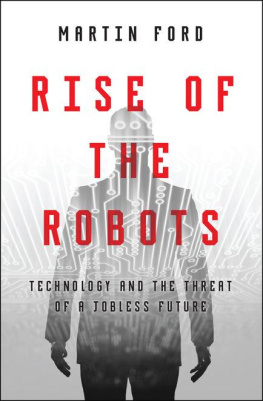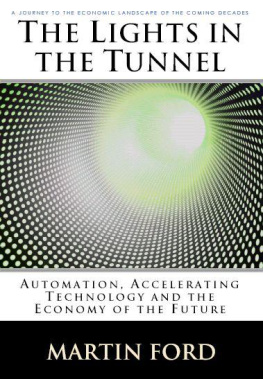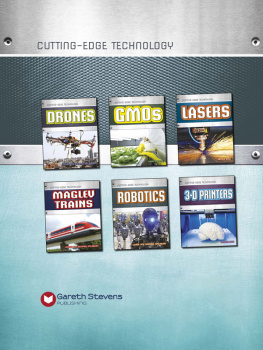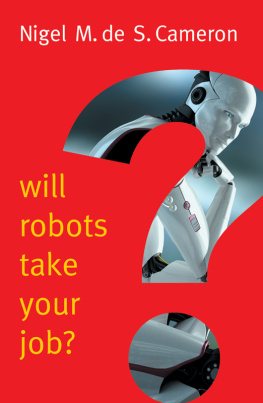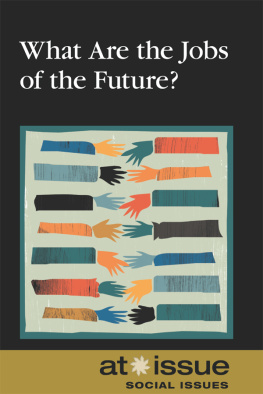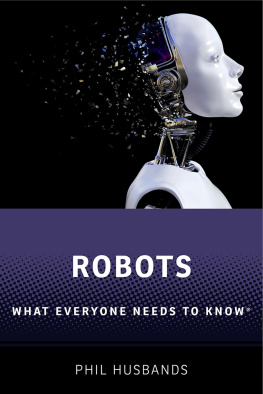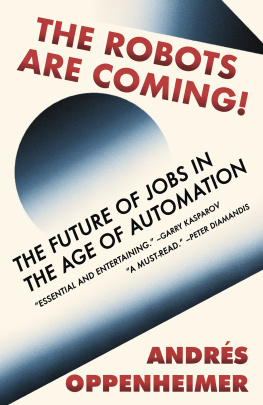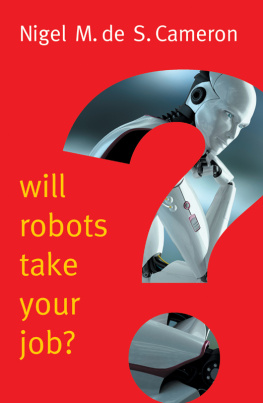Rise of the Robots: Technology and the Threat of a Jobless Future Martin FordBasic Books (2015)
What are the jobs of the future? How many will there be? And who will have them? We might imagineand hopethat todays industrial revolution will unfold like the last: even as some jobs are eliminated, more will be created to deal with the new innovations of a new era. In Rise of the Robots , Silicon Valley entrepreneur Martin Ford argues that this is absolutely not the case. As technology continues to accelerate and machines begin taking care of themselves, fewer people will be necessary. Artificial intelligence is already well on its way to making good jobs obsolete: many paralegals, journalists, office workers, and even computer programmers are poised to be replaced by robots and smart software. As progress continues, blue and white collar jobs alike will evaporate, squeezing working- and middle-class families ever further. At the same time, households are under assault from exploding costs, especially from the two major industrieseducation and health carethat, so far, have not been transformed by information technology. The result could well be massive unemployment and inequality as well as the implosion of the consumer economy itself.
In Rise of the Robots , Ford details what machine intelligence and robotics can accomplish, and implores employers, scholars, and policy makers alike to face the implications. The past solutions to technological disruption, especially more training and education, arent going to work, and we must decide, now, whether the future will see broad-based prosperity or catastrophic levels of inequality and economic insecurity. Rise of the Robots is essential reading for anyone who wants to understand what accelerating technology means for their own economic prospectsnot to mention those of their childrenas well as for society as a whole.
RISE OF THE ROBOTS
ALSO BY Martin Ford:

The Lights in the Tunnel: Automation, Accelerating Technology and the Economy of the Future

Copyright 2015 by Martin Ford
Published by Basic Books,
A Member of the Perseus Books Group
All rights reserved. Printed in the United States of America. No part of this book may be reproduced in any manner whatsoever without written permission except in the case of brief quotations embodied in critical articles and reviews. For information, address Basic Books, 250 West 57th Street, New York, NY 10107.
Books published by Basic Books are available at special discounts for bulk purchases in the United States by corporations, institutions, and other organizations. For more information, please contact the Special Markets Department at the Perseus Books Group, 2300 Chestnut Street, Suite 200, Philadelphia, PA 19103, or call (800) 810-4145, ext. 5000, or email .
Designed by Pauline Brown
Library of Congress Cataloging-in-Publication Data
Ford, Martin (Martin R.)
Rise of the robots: technology and the threat of a jobless future / Martin Ford.
pages cm
Includes bibliographical references and index.
ISBN 978-0-465-04067-4 (e-book) 1. Labor supplyEffect of automation on. 2. Labor supplyEffect of technological innovations on. 3. Employment forecasting. 4. Technological innovationsEconomic aspects. I. Title.
HD6331.F58 2015
331.13'7042dc23
2014041327
10 9 8 7 6 5 4 3 2 1
To Tristan, Colin,
Elaine, and Xiaoxiao
CONTENTS
Sometime during the 1960s, the Nobel laureate economist Milton Friedman was consulting with the government of a developing Asian nation. Friedman was taken to a large-scale public works project, where he was surprised to see large numbers of workers wielding shovels, but very few bulldozers, tractors, or other heavy earth-moving equipment. When asked about this, the government official in charge explained that the project was intended as a jobs program. Friedmans caustic reply has become famous: So then, why not give the workers spoons instead of shovels?
Friedmans remark captures the skepticismand often outright derisionexpressed by economists confronting fears about the prospect of machines destroying jobs and creating long-term unemployment. Historically, that skepticism appears to be well-founded. In the United States, especially during the twentieth century, advancing technology has consistently driven us toward a more prosperous society.
There have certainly been hiccupsand indeed major disruptionsalong the way. The mechanization of agriculture vaporized millions of jobs and drove crowds of unemployed farmhands into cities in search of factory work. Later, automation and globalization pushed workers out of the manufacturing sector and into new service jobs. Short-term unemployment was often a problem during these transitions, but it never became systemic or permanent. New jobs were created and dispossessed workers found new opportunities.
Whats more, those new jobs were often better than earlier counterparts, requiring upgraded skills and offering better wages. At no time was this more true than in the two and a half decades following World War II. This golden age of the American economy was characterized by a seemingly perfect symbiosis between rapid technological progress and the welfare of the American workforce. As the machines used in production improved, the productivity of the workers operating those machines likewise increased, making them more valuable and allowing them to demand higher wages. Throughout the postwar period, advancing technology deposited money directly into the pockets of average workers as their wages rose in tandem with soaring productivity. Those workers, in turn, went out and spent their ever-increasing incomes, further driving demand for the products and services they were producing.
As that virtuous feedback loop powered the American economy forward, the profession of economics was enjoying its own golden age. It was during the same period that towering figures like Paul Samuelson worked to transform economics into a science with a strong mathematical foundation. Economics gradually came to be almost completely dominated by sophisticated quantitative and statistical techniques, and economists began to build the complex mathematical models that still constitute the fields intellectual basis. As the postwar economists did their work, it would have been natural for them to look at the thriving economy around them and assume that it was normal: that it was the way an economy was supposed to work and would always work.
In his 2005 book Collapse: How Societies Choose to Succeed or Fail, Jared Diamond tells the story of agriculture in Australia. In the nineteenth century, when Europeans first colonized Australia, they found a relatively lush, green landscape. Like American economists in the 1950s, the Australian settlers assumed that what they were seeing was normal, and that the conditions they observed would continue indefinitely. They invested heavily in developing farms and ranches on this seemingly fertile land.
Within a decade or two, however, reality struck. The farmers found that the overall climate was actually far more arid than they were initially led to believe. They had simply had the good fortune (or perhaps misfortune) to arrive during a climactic Goldilocks perioda sweet spot when everything happened to be just right for agriculture. Today in Australia, you can find the remnants of those ill-fated early investments: abandoned farm houses in the middle of what is essentially a desert.
There are good reasons to believe that Americas economic Goldilocks period has likewise come to an end. That symbiotic relationship between increasing productivity and rising wages began to dissolve in the 1970s. As of 2013, a typical production or nonsupervisory worker earned about 13 percent less than in 1973 (after adjusting for inflation), even as productivity rose by 107 percent and the costs of big-ticket items like housing, education, and health care have soared.
Next page
